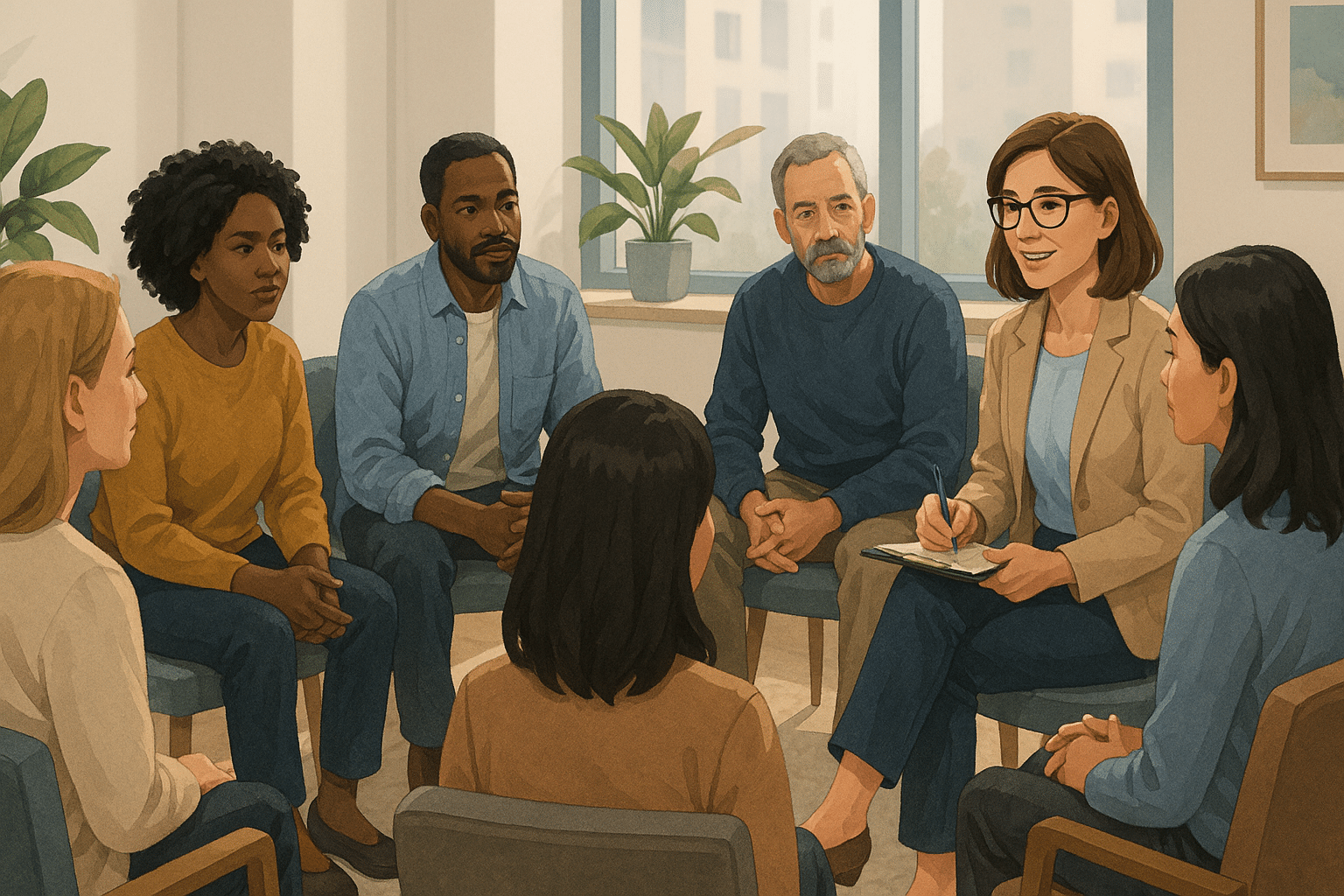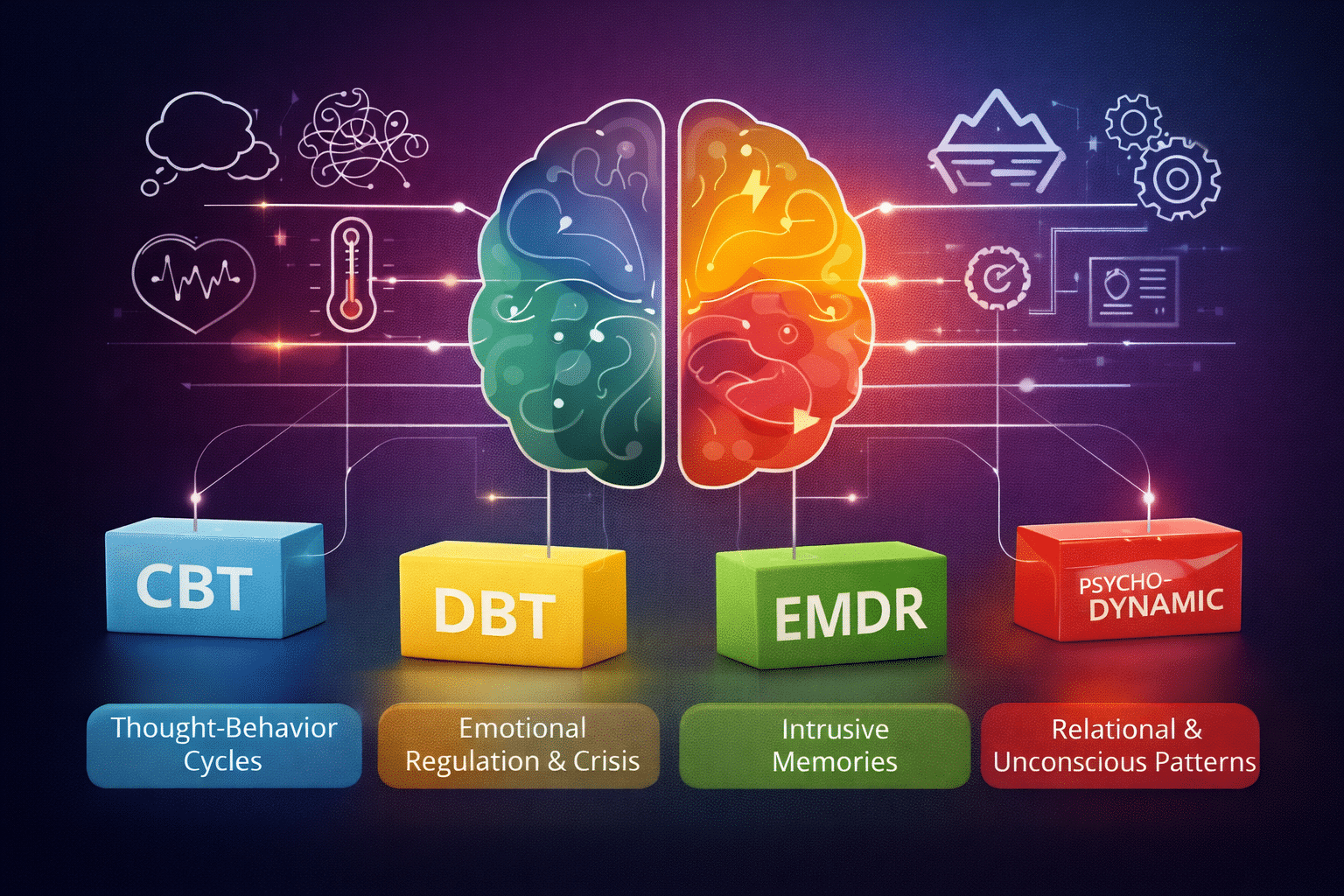Most people don’t talk about it, but struggling with your mental health can feel incredibly lonely. You might be going to appointments, taking meds, doing your best, and still feel like you’re carrying everything by yourself. That isolation isn’t just exhausting. It slows healing.
What if that part could change?
In group therapy, you sit in a room, sometimes virtual, sometimes in person, with people who know exactly what you’re going through. Different stories, same weight, and when that weight is shared, something starts to shift. You begin to see progress not just in yourself, but in others. That kind of momentum is hard to create on your own.
This blog unpacks how group therapy works, where it fits in mental health treatment, and why Zeam includes it as part of a holistic psychiatry model for faster, fuller recovery.
Debunking Group Therapy Myths
Most people picture group therapy as a circle of strangers venting into the void. That image is old and wrong. Here are a few myths we hear often, and what the research says in response.
“It’s Just Complaining”
Groups follow structured models like CBT or DBT. There’s a start, a focus, and a plan. The American Psychological Association’s 2023 synthesis of 329 studies confirmed that group formats are as clinically effective as individual therapy for a wide range of issues.
“I Won’t Get Enough Attention”
You will. Groups are small, usually six to ten people. Everyone gets space to share. Connection with the group and the therapist matters just as much as what you say. In group CBT group studies, participants who felt more connected had better outcomes that lasted up to four years.
“It’ll Be Awkward”
At first, maybe. But it fades fast. A randomized trial on a CBT-based stigma program found that self-stigma dropped significantly after group participation. When you hear someone else say what you’ve been thinking, awkward turns into relief.
The Unique Benefits of a Group Setting
Most people come to therapy to get better. But in a group, you start helping others get better, too. That dynamic of giving and taking is what makes group settings so effective.
Reduced Stigma and Normalization
It’s one thing to hear “you’re not alone” from a therapist. It’s another to feel it when someone else across the room says they also cried in the car for an hour. That’s what happens in group therapy. Shame starts to lose its grip.
Accountability and Motivation
Showing up for yourself is hard. Showing up when others are counting on you is a bit easier.
Long-term follow-up studies in CBT group settings have linked group cohesion, the bond between members, to outcomes that stick for years. That suggests something important: People don’t just learn in group therapy; they keep using what they learned.
A Practice Space for New Skills
Therapy is great for insights. However, skills need practice.
In groups focused on anxiety treatment, for example, participants rehearse boundary-setting, emotional regulation, and social interactions in a space that feels both safe and real.
Shared Solutions, Real Stories
You get tips you’d never find in a workbook. One person talks about what helped their panic attacks at work. Someone else describes how they finally got through a depressive slump. You realize there isn’t just one way to get better.
Why Group Therapy Works for Specific Conditions
Group therapy isn’t one-size-fits-all, but the data shows it can be highly effective across many conditions, especially when structured well.
Depression Treatment
Depression isolates. Groups reconnect.
A mega-meta of 409 trials and 52,702 participants showed that CBT reduced symptoms across delivery formats, including individual, group, and even unguided digital, with gains that held steady for up to a year. That tells us that you don’t need to be alone in a room to get better.
In Uganda, a non-inferiority study tested whether a six-week group IPT program could match the outcomes of an eight-week version. It did, which means shorter programs can work just as well, saving people time and keeping them engaged.
In teens, the response is even faster. A randomized trial of 92 adolescents found that those in group therapy plus medication improved more at just four weeks than peers who received medication alone. Not only were depression and anxiety scores lower, but those in groups stuck with their treatment plans longer.
Anxiety Treatment
The data for anxiety treatment is clear: Group CBT is effective.
A network meta-analysis of 65 RCTs found that CBT, whether in groups or one-on-one, outperformed usual care in the short term. And it was the only therapy that maintained long-term results.
Format doesn’t seem to matter much either. A review of 51 RCTs (over 5,000 participants) found no major differences in outcomes between group vs. individual formats. In remote vs. in-person, therapist-guided online CBT worked just as well.
Trauma
This one’s more complex. Group therapy helps, but the fit matters.
VA studies on cognitive processing therapy (CPT) show that both individual and group formats reduce PTSD symptoms. However, individual CPT tends to lower PTSD scores more. Still, group therapy was just as effective for depression and suicidal ideation, both common in trauma recovery.
What to Expect in a Zeam Therapy Group
You don’t need to guess what this looks like. Here’s how group therapy works at Zeam:
- Confidential and supportive: Each group follows clear privacy guidelines.
- Led by licensed clinicians: Zeam’s group leaders are trained in evidence-based models like CBT, DBT, and IPT.
- Small groups: 6–10 in size, allowing everyone adequate room to speak.
- Weekly sessions: Once per week; sessions run anywhere from 60–120 minutes depending on the group.
- Specialized focus areas: Groups include options for anxiety, depression, trauma, and DBT-based skill-building.
- Lots of choices: In-person groups are offered in Sacramento, Roseville, and Folsom. If you live too far away, you can participate via remote session.
If you are looking for psychiatry near you, Zeam offers group therapy that complements your depression and anxiety treatment and provides another path forward, especially when you’re ready for deeper connection.
If you are seeking a new way forward, we’ll help you find the group that fits. Reach out today to explore Zeam’s current therapy groups and see how shared healing can speed your recovery.
Key Takeaways with Citations
- Group therapy is as effective as individual therapy — A 2023 APA review of 329 studies confirmed that structured group models like CBT and DBT provide comparable clinical benefits across conditions 【https://www.apa.org/monitor/2023/03/continuing-education-group-therapy】.
- Shared experience reduces stigma and loneliness — Studies show that group therapy lowers self-stigma, builds cohesion, and creates lasting improvements by helping patients realize they are not alone 【https://pubmed.ncbi.nlm.nih.gov/39377870/】.
- Group formats work well for depression and anxiety — A mega-meta of 409 trials found CBT effective across delivery methods, including group therapy, with results holding steady for up to a year 【https://jamanetwork.com/journals/jamanetworkopen/fullarticle/2832853.
- Youth see accelerated results with groups — In teens, combining group therapy with medication improved depression and anxiety scores within four weeks, faster than medication alone 【https://www.frontiersin.org/journals/psychology/articles/10.3389/fpsyg.2025.1657172/full.
- Trauma recovery benefits, but fit matters — VA research on cognitive processing therapy (CPT) shows both group and individual formats reduce PTSD, with group settings being especially effective for depression and suicidal ideation 【https://www.ptsd.va.gov/professional/treat/txessentials/cpt_for_ptsd_pro.asp.




